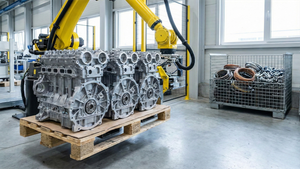(BPT) - Whether it's served hot or iced, sweetened or black, coffee remains one of the most popular beverages in the United States - and the world. According to Drive Research, 73% of Americans enjoy coffee daily, and a whopping 93% consume it at least once per week. But the cost of this favorite drink keeps increasing, putting the rapidly growing $130 billion coffee industry at risk as global warming could reduce available viable land for coffee cultivation up to 50% by 2050. Coffee consumption has skyrocketed 60% over the last 30 years, resulting in significant environmental damage in coffee-growing regions, including deforestation, increased water usage and extensive pesticide use.
Due to extreme weather, logistical hurdles, workforce shortages, and increasing demand driving up coffee costs, the need for long-term solutions to improve coffee cultivation has never been more pressing. One groundbreaking biotech company, Pluri (Nasdaq: PLUR), is answering the call by pioneering cell-based coffee production through its subsidiary, Coffeesai.
Coffeesai uses advanced 3D cell technology to produce authentic ground coffee in a lab using a patented, scalable cell cultivation production system - without the constraints involved with traditional coffee farming. This innovative process mimics nature without exploiting it, ensuring consistent quality and high yields while using minimal resources.

Cell-based coffee production directly addresses some key factors behind coffee price volatility:
Supply chain resilience: Bio-farming removes reliance on weather-sensitive crops, mitigating climate-related disruptions.
Higher efficiency: The bio-farming system is designed to scale up production by generating the equivalent of 80,000 coffee plants in just three weeks, using only plant leaves.
Sustainability and cost reduction: This method slashes water usage by 98%, addressing a major driver of coffee production costs and its environmental impact.
While coffee production challenges persist, world demand for coffee is expected to triple by 2050. The cell-based production method minimizes the environmental impact of coffee production, as current production methods have a high carbon footprint, and upcoming regulations are expected to further strain producers.
"Cell technology can make farming and food cultivation more productive and sustainable for the future, starting with transforming coffee production," said Pluri CEO and president Yaky Yanay. "Our advanced agtech solutions have the potential to reduce the environmental footprint of traditional agricultural production, overcoming the biggest challenges posed by climate change."
The future of coffee
By using cutting-edge cellular agriculture technology to produce cell-based real coffee, Coffeesai delivers the perfect cup without depleting the planet's resources. Coffeesai's cell-based coffee is:
- Pesticide and contaminant free
- Consistently perfect in flavor profile
- Available year-round, independent of harvest seasons
- Scalable to meet commercial needs
Coffeesai can also produce customized products like naturally decaffeinated coffee.
This process improves the supply chain, helps protect the environment and makes pricing more predictable by decreasing labor costs and the production footprint, while helping reduce deforestation, pesticide usage and agricultural waste. Bio-farming also reduces the carbon emissions related to farming, transportation and roasting.
"It's not just a cup of coffee: Coffeesai is a commitment to innovation, sustainability and the joy of a perfectly brewed cup," added Yanay.
Whether you're a coffee lover or eco-advocate, Coffeesai offers an unmatched, sustainable coffee experience without compromising on taste - or harming the planet.
Learn how Pluri and Coffeesai are pushing the boundaries of science and engineering to create cell-based products for commercial use, pioneering a biotech revolution that promotes global well-being and sustainability, at Pluri-Biotech.com/landing-pages/coffee.






